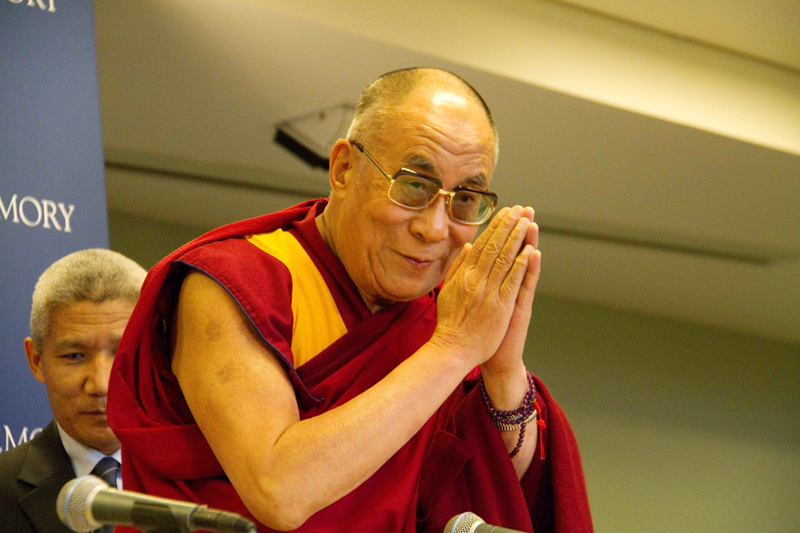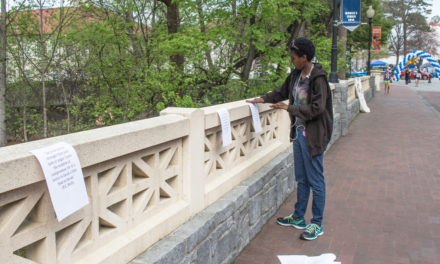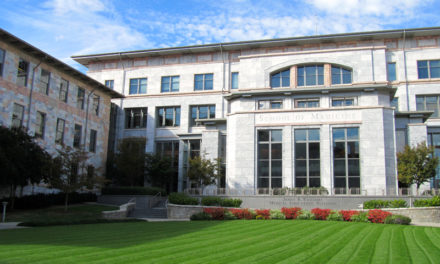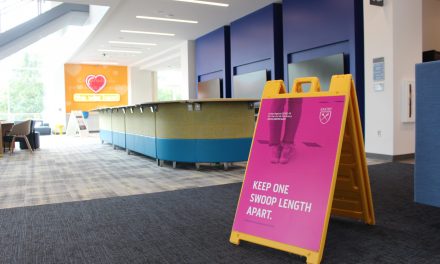His Holiness the XIV Dalai Lama’s participation has become the face of the Emory-Tibet Partnership (ETP), an initiative that has far exceeded its modest origins.
The senior religious leader of Tibetan Buddhism returns to Atlanta today as part of “The Visit 2013,” a three-day series of public and campus events.
This is the Dalai Lama’s third visit to Emory since his appointment as presidential distinguished professor in October 2007. He last visited in October 2010.
The Dalai Lama’s campus visits are but one aspect of a partnership that has established course offerings in Tibetan Buddhism, culture and language. The partnership has also provided Emory students the opportunity to study in Dharamsala at the Buddhist Institute of Dialectics.
Every two years, a select number of Tibetan monks study at Emory as part of the Emory-Tibet Science Initiative to train future teachers of modern science within the monastic community.
Emory faculty and Tibetan translators are also collaborating on the design and implementation of a comprehensive science program into the monastic curriculum. Other ETP programs feature research involving Tibetan medicine and the effects of compassion-based meditation.
The Emory-Tibet Partnership began in 1998 as an affiliation between Emory and the Drepung Loseling Monastery, Inc. Center for Tibetan Studies.
Located in Atlanta, Drepung Loseling is the American seat of Drepung Monastery, one of the three main Tibetan Buddhist monasteries.
The origin of this partnership, as well as its subsequent development, traces back to two current Emory faculty members, Robert Paul and Lobsang Tenzin Negi. Paul is the Charles Howard Candler Professor of Anthropology and Interdisciplinary Studies within Emory’s Institute of Liberal Arts and former Dean of the College, while Negi is the ETP Director and Senior Lecturer in the Religion Department.
Negi left the Himalayan valley at a young age to begin his monastic training in Dharamsala.
In the early 1990s, Negi relocated to Atlanta, and he pursued his graduate studies at Emory with Paul as his advisor. The two discussed Emory’s lack of Tibetan-related academic opportunities. The conversation eventually led to an idea for a partnership.
“If [Negi] hadn’t been here this wouldn’t have happened,” Paul said. “Since he had direct access to the Dalai Lama and had been sent here by the Dalai Lama, we have had a direct line of communication.”
Paul recalled receiving a phone call from a colleague, John Fenton, a professor of religion, informing him that a Tibetan monk was in town. Paul, who had worked with Sherpa people in Nepal as an anthropologist, has a “deep affinity” for many aspects of Tibetan culture, and he agreed to a meeting.
The monk, Negi, came to Atlanta in 1991 with the assignment to start and develop a teaching center, what would eventually become Drepung Loseling Monastery, Inc.
Paul and Negi met for lunch at Jagger’s Café in Emory Village, where Ink & Elm currently operates.
“I was very impressed with him and delighted that there was going to be a Tibetan Center here,” Paul said.
In addition to establishing a teaching center, the Dalai Lama had asked Negi to study the western sciences, in particular psychology and cognitive science.
According to Negi, the Dalai Lama has long been interested in integrating eastern and western academic traditions, in particular scientifically understanding the various contemplative aspects of the mind that are represented in the Tibetan Buddhist tradition.
Once Paul learned of Negi’s intention to study while setting up the teaching center, he arranged for Negi to apply to the ILA. Negi was accepted as a graduate student and began his graduate studies at Emory in 1991.
Negi studied the interface of Tibetan Buddhism and modern science, with a focus in the field of emotions.
Emory offered a single survey course in Buddhism in the early 90s.
Advisor and advisee discussed this lack of academic opportunity for students to study Tibetan Buddhism and different meditations. The first ideas of a partnership began to take root.
“At the time, the thought I had was we probably would never have a Tibetan Studies program here at Emory, but wouldn’t it be great if some of the people connected at Loseling? If students could go over there and take Tibetan language and study Tibetan philosophy, Buddhist philosophy or something?” Paul said. “I had an idea that maybe we can have a study abroad in town, where you can go and get credit for doing something in Loseling.”
In March 1994, Negi presented the idea of some form of Emory-Drepung Loseing affiliation to the Dalai Lama in Dharamsala. Negi founded the Drepung Loseling monastery in Atlanta, but he needed the Dalai Lama’s approval before an affiliation or partnership could move forward.
The Dalai Lama thought it was a great idea, according to Negi. He and a fellow monk drafted a letter from the Office of the Dalai Lama voicing support for an affiliation.
Despite having the Dalai Lama’s approval, no progress was made until the summer of the next year. It was 1995, and in early September, the Dalai Lama was scheduled to kick off a 12-day U.S. tour in Atlanta. A few months before the Dalai Lama’s visit, Negi received a call from Lodi Gyari, the Dalai Lama’s special envoy in Washington and chairman of the International Campaign for Tibet (ICT), a D.C.-based advocacy group.
ICT was coordinating the Dalai Lama’s visit to Atlanta to meet with former President Jimmy Carter, when Lodi Gyari asked if Emory would be interested in hosting a Dalai Lama visit. Negi, still a graduate student at the time, referred the first request to Vice President and Deputy to the President Gary Hauk, then the Secretary to the University, who said yes. Anticipating that the Dalai Lama would follow up and inquire on the partnership idea, Negi met with Paul, who advised Negi to write a proposal to the University for an affiliation.
Hauk spoke with then University President William Chace, who liked the proposal idea. Hauk then organized a committee, comprised of administrators, senior professors (including Paul) and Negi, to meet with the Dalai Lama.
The committee’s principal goal was to propose to the Dalai Lama the possibility of exploring ways that Emory may collaborate with Tibetan institutions of learning, Hauk wrote in an email to the Wheel.
According to Negi, the Emory delegation met the Dalai Lama at the Ritz Carlton, where His Holiness was staying.
“His Holiness asked the Deans and the committee there: ‘do you really see some value in this kind of partnership relationship?’ And all of them said ‘yes,'” Negi said. “His Holiness said, ‘then, we should do it, but let’s start small. If it’s beneficial, if it’s meaningful, then it will grow.'”
After this first meeting, the idea of a partnership was again put on the backburner. The idea did not move forward until late 1996, Negi said, when Hauk contacted him for assistance in securing the Dalai Lama for the 1998 Commencement address.
“If we were to invite His Holiness to do the Commencement speech, then we have to also have something about this conversation we started with him in ’95,” Negi said.
After securing the Dalai Lama for the 1998 Commencement, Emory began formulating an affiliation with nearby Drepung Loseling. The agreement was broad and made room for the possibility that a number of schools and colleges at Emory could become involved in programs with the Dalai Lama, Hauk wrote in an email to the Wheel.
The affiliation between Emory and Drepung Loseling Monastery was formally inaugurated on May 12, 1998. In the presence of the Dalai Lama, Abbot Konchok of Drepung Loseling and Chace were the document signees.
Drepung Loseling was ultimately deemed too small to host students for credit courses, Negi said, so Tibet-related courses were instead offered on campus. Professor Wendy Farley and Negi directed a six-week summer program on Tibetan Buddhism, culture and language that summer.
Today, with study abroad and cross-cultural research, ETP broadly aims to integrate the western scientific tradition and its focus on the material universe with Tibetan Buddhism.
“The aim was to put those things together and create generations of students and later teachers who would have been exposed to both systems of thought and hopefully come up new and creative ways of putting these things together,” Paul said.
While the Dalai Lama’s high profile campus visit will keep Emory abuzz this week, some say the real excitement lies in ETP and its initiatives, which will strive to cross-fertilize future generations of students and future reincarnations alike.
– By Vincent Xu
The Emory Wheel was founded in 1919 and is currently the only independent, student-run newspaper of Emory University. The Wheel publishes weekly on Wednesdays during the academic year, except during University holidays and scheduled publication intermissions.
The Wheel is financially and editorially independent from the University. All of its content is generated by the Wheel’s more than 100 student staff members and contributing writers, and its printing costs are covered by profits from self-generated advertising sales.







congratulations for the beautiful text
como reconquistar http://www.outrachance.com.br/